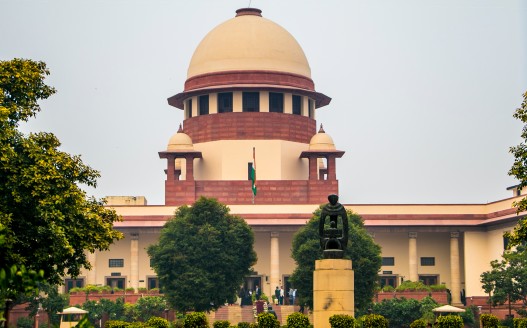Experts were divided on the Supreme Court verdict on the appointment of chief election commissioners and election commissioners with some hailing the order while others saying the top court is not mandated to legislate and enter the domain of the Executive and the Legislature.
In a landmark verdict aimed at insulating the appointment of Chief Election Commissioner (CEC) and election commissioners from the Executive's interference, the Supreme Court on Thursday ruled that their appointments will be done by the President on the advise of a committee comprising the prime minister, leader of opposition in the Lok Sabha and the Chief Justice of India.
A five-judge constitution bench headed by Justice KM Joseph, in a unanimous verdict, held that this norm will continue to hold good till a law on the issue is made by Parliament.
A vacancy will arise in the poll panel early next year when Election Commissioner Anup Chandra Pandey demits office on February 14 on attaining the age of 65 years.
His retirement will come just days before the likely announcement of the 2024 Lok Sabha polls' scheduled by the Election Commission. On the past two occasions, the EC had announced parliamentary polls in March.
S Y Quraishi, who was the chief election commissioner between July 30, 2010, and June 10, 2012, said it was an "excellent judgment".
"The Election Commission has been demanding it for a good 20 years or more. The incumbent CECs have themselves written about it several times. I have written about it as incumbent CEC then, and as former CEC repeatedly that the appointment of election commissioners should be through collegium," he said.
"The elevation (of election commissioners) as CEC should be automatic by seniority and protection from removal which is available to the CEC should be extended to the two other members (of the EC)," Quraishi said.
While the CEC and judges of the constitutional courts can only be removed by Parliament through an impeachment process, the election commissioners can be removed by the government on the recommendation of the CEC.
The government has been following the convention of appointing the senior-most election commissioner as the CEC.
Quraishi said the process should be automatic as election commissioners feel like "probationers" wondering whether they will be elevated as CEC.
However, former Union law secretary P K Malhotra, who had also headed the Legislative Department in the law ministry, felt that through the verdict, the top court is legislating, which is not its domain but of Parliament.
"So you are basically legislating in an area where you have no authority.You can interpret the law, you can interpret the Constitution ... that is fine. They must have said this (the SC bench) for greater transparency. But the same thing can be said with regard to the appointment of judges also that there should be transparency, there should be a procedure," he said, referring to the collegium system of appointing judges which the government says lacks transparency.
"The Supreme Court, simply because it has some power to issue directions, issues a direction in respect of the area which falls in the area of the Executive under the Constitution, I think it is going beyond the power conferred on them (Judiciary) by the Constitution," he said noting that he is yet to go through the complete order.
Former Lok Sabha secretary general and Constitution expert P D T Achari said going by the media reports, it was a welcome move as it was a departure from the past practice.
He said so far, the government was appointing members of the poll panel without consulting other agencies.
"Now both the Legislature and the Judiciary will be part of the decision-making process. That is a very important development. To that extent it is very good," he said.
Achari noted that the verdict is temporary in nature and will hold good till Parliament makes a law on the issue. "In that they can suggest something else. It can be in the favour of the government. So it is not that the SC judgment is the final thing on this ... the (SC) decision is more democratic," he said.
Another former CEC, who did not wish to be named, said that "then the prime minister should head a body to appoint judges".
Seeking to overturn the present collegium system, Parliament had passed the National Judicial Appointments Commission Act which was later struck down by the Supreme Court. The law sought to set up a body to appoint Supreme Court and high court judges.
The 20th Law Commission, headed by Justice A P Shah (retd), in its 255th report on electoral reforms submitted to the government in March 2015, had recommended a three-member collegium to appoint the CEC and the election commissioners.
"Given the importance of maintaining the neutrality of the EC and to shield the CEC and election commissioners from Executive interference, it is imperative that the appointment of Election Commissioners becomes a consultative process," it had said.
The report said the commission considers the inclusion of the prime minister is important as a representative of the current government.
According to the EC website, originally the commission had only a CEC. It currently consists of the CEC and two election commissioners.
Two additional commissioners were first appointed on October 16, 1989, but they had a very short tenure till January 1, 1990. Later, on October 1, 1993, two additional election commissioners were appointed.
The concept of a multi-member EC has been in operation since then, with decision made by majority vote.
The president appoints CEC and election commissioners on the advice of the government. They have a tenure of six years, or up to the age of 65 years, whichever is earlier.











